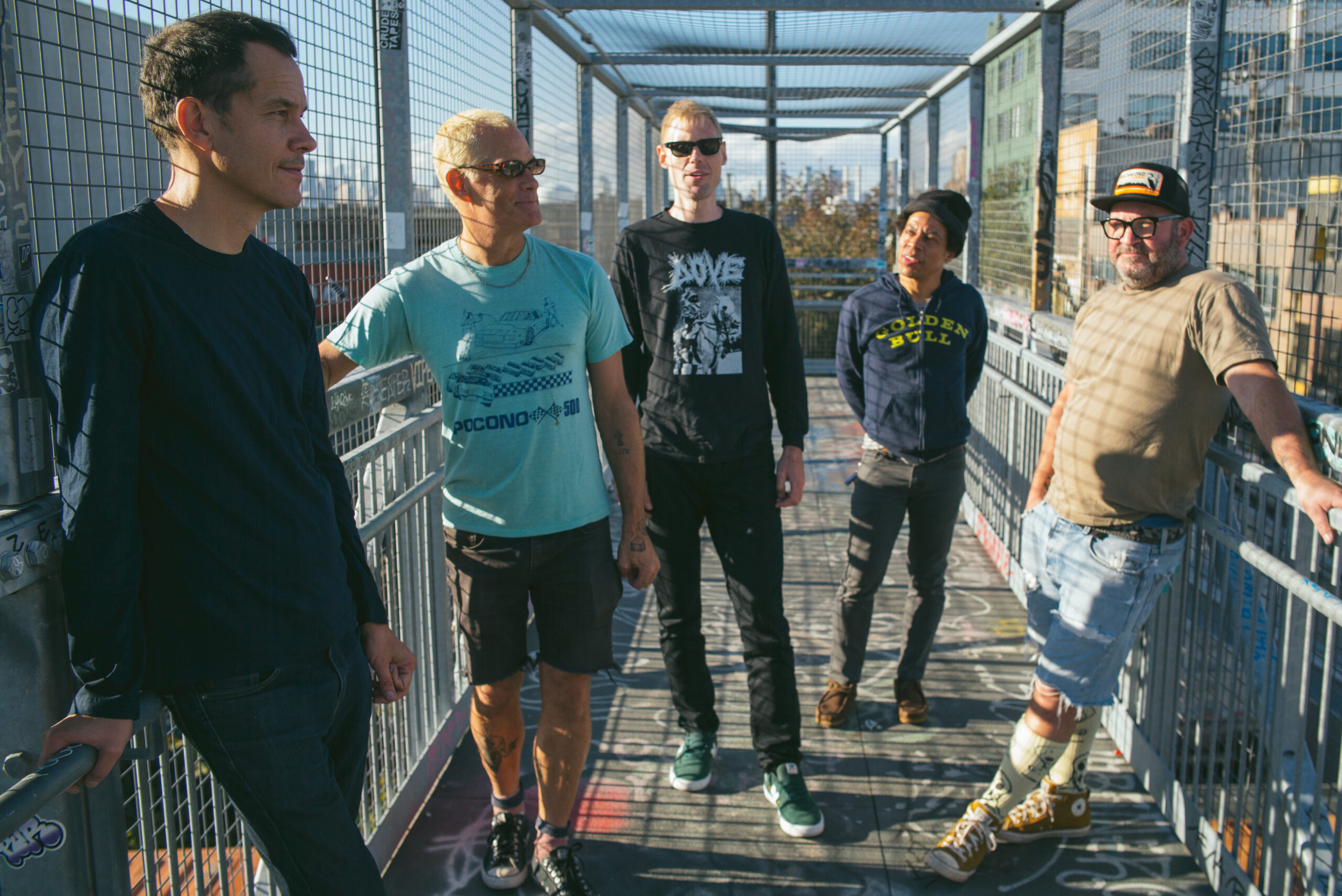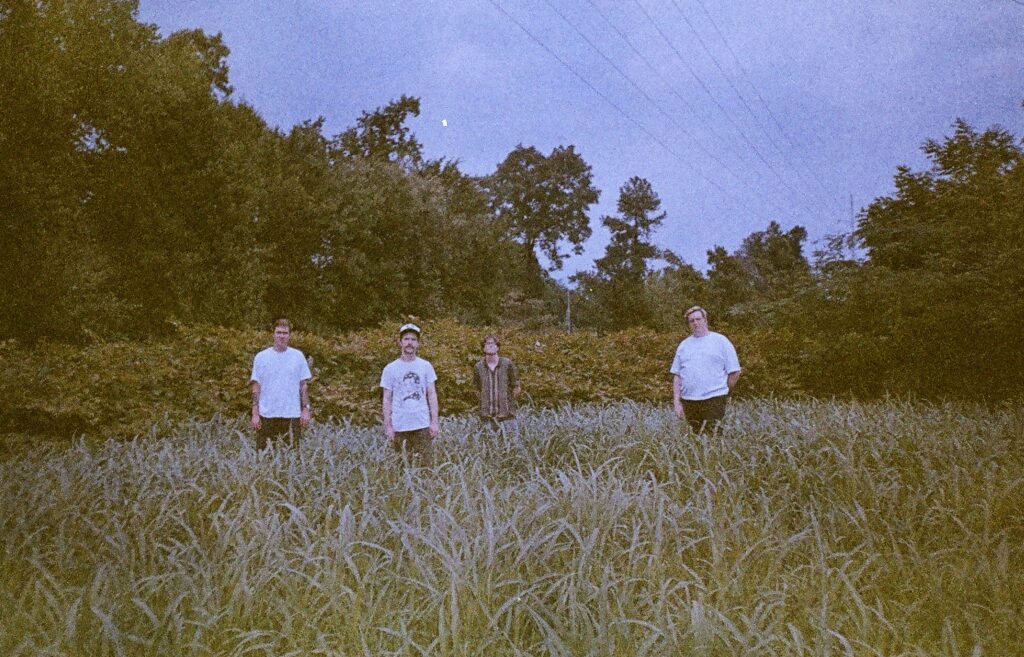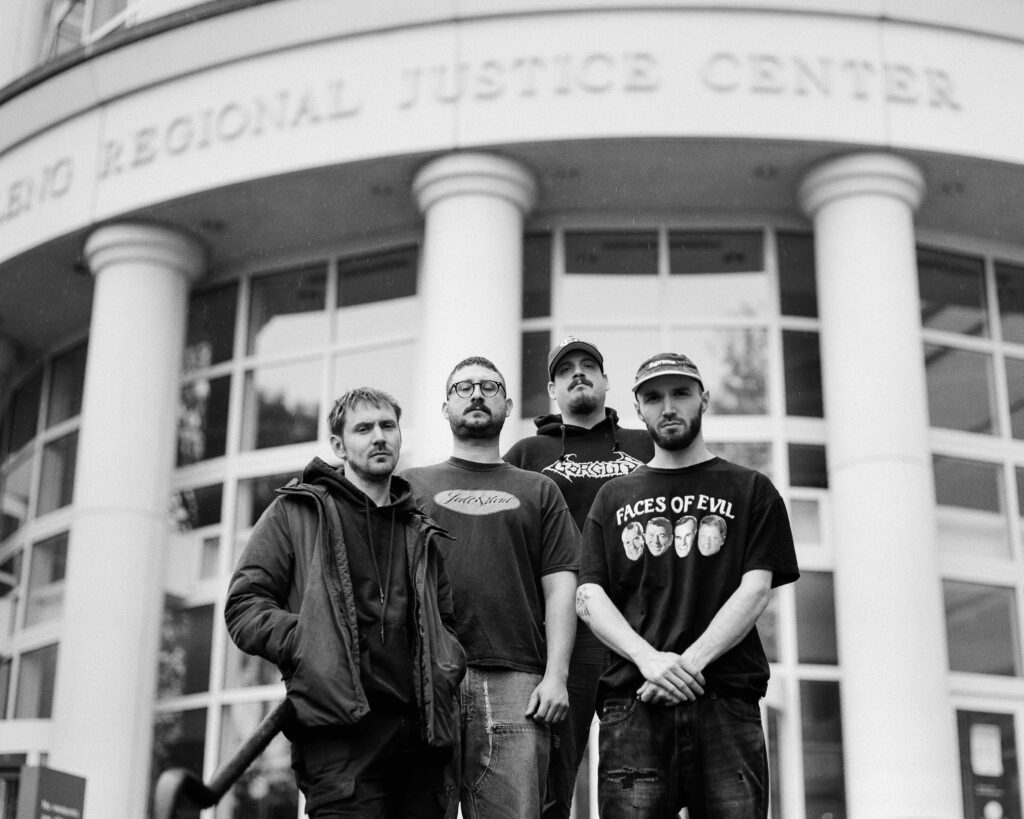Samiam wouldn’t be the same without a little bit of chaos. Over their three decades together, the Oakland, CA-based band have specialized in energetic hard luck songs that are as hooky as they are relatable, so perhaps it’s fitting that the creation of Stowaway, the band’s first new album in 12 years and their ninth full-length overall, wasn’t the easiest. But there are very few bands better at capturing the feeling of stumbling only to get up again, and on Stowaway, Samiam prove exactly why they remain one of the most endearing and enduring punk bands of their generation.
Forming in 1988, Samiam–whose current lineup includes longtime members Jason Beebout (vocals), Sean Kennerly (guitar), and Sergie Loobkoff (guitar), as well as newer additions Colin Brooks (drums) and Chad Darby (bass)–grew out of the DIY punk scene of 924 Gilman Street, experienced the major label alt rock feeding frenzy firsthand in the 1990s, and eventually slowed down in the 2000s. After the release of 2011’s Trips, the band didn’t quite break up and they continued to sporadically play shows, but the demands of life (not to mention all the members living in different parts of the country) put their songwriting process on quasi-hiatus. The years ticked by and it began to seem like there wouldn’t be new Samiam material–but it wasn’t for lack of trying.
“A very slow accretion of pressure over many years led to the decision to make a new record,” explains Kennerly. “We had been lazily working on a few new songs here and there for years–as far back as 2014, when we tried and failed to record a little demo after Riot Fest. But Sergie and I just kept writing the beginnings of songs and sending them around to everyone, and suddenly one day about four years ago we were like, ‘This is enough for an album!’” After joining up with Pure Noise Records, the band began to get more serious about polishing their material, booking time at Billie Joe Armstrong’s Otis Studio in Oakland and beginning to hammer out the initial recordings in February 2020. A month later the pandemic turned the world upside down, and like everyone, Samiam’s plans were once again on hold.
“We didn’t have any idea then what was happening, when it was going to be over or whether it was going to just kill everyone and destroy the world,” remembers Kennerly. “It made the recording process take a ridiculously long time, even longer than the ridiculously long time that it was already taking.” Over many months, the group chipped away at the instrumentals, recording sporadically in various studios in various locations: Brooks found his way to Savaria Studios in Brooklyn, NY, where he recorded the drums with Jon Markson (Drug Church, Koyo, Soul Blind); Darby, Loobkoff, and Kennerly flew down to Gainesville, FL, to keep working on the song skeletons they’d started back in Oakland; eventually, it Beebout and Kennerly headed back to Otis to record vocals. “It was just Jason and I,” says Kennerly, “I was doing background vocals and Jason was doing main vocals, but he didn’t have any material. We were stuck. We’d gone through all of these hoops and hurdles, and there was nothing to record. We spent a week there and came back with nothing.” It was another discouraging false start, but Beebout was not deterred. “Maybe people over 50 in bands should admit that they’re probably too old to be in this business,” he says. “Most of them are–I’m not. I never worried whether or not I could sing. I just wasn’t sure if I wanted to.”
Kennerly and Beebout regrouped with engineer Scott Evans (Thrice, American Steel, Floor) at Antisleep Studios and began coaxing out vocal takes. “Everyone in the band was worried whether or not Jason would still be able to do it,” admits Kennerly, “because we hadn’t recorded anything in a decade. Like, did Jason still have the pipes for it? After our experience at Otis, we wondered whether he was nervous because he couldn’t sing anymore, but on the first day at Antisleep we recorded the first song ‘Lake Speed,’ and he did it all in one take and it was blisteringly great.” Loobkoff adds, “A lot of this band rests on Jason’s shoulders. Musically, for the other four of us, it’s easier than it is for him because it’s not coming out of our lungs and our hearts and our throats and our bodies like vocals are. He really has to pour his soul out.”After seemingly endless starts and stops, the arduous writing and recording process was finally done. “There were a lot of times when it seemed like it was just going to completely fall apart, and we wouldn’t actually get everything done,” says Kennerly. “It would have probably been the end of the band if we hadn’t pulled it together by the skin of our teeth, but we finally did and I think everyone was a little bit surprised.”
Perhaps even more surprising is the undeniably confidence of the final result. Stowaway seamlessly picks up where Samiam left off, with just as much energy, melody, and pathos as their classic works. From the bristling kineticism of opener “Lake Speed,” to the impassioned melancholy of the closing title track, the band sounds just as vital as ever. Kennerly and Loobkoff weave their dual guitar attack over Darby and Brooks’ taut rhythm section, while Beebout’s voice soars from one anthemic chorus to the next, his trademark tuneful grit still intact. But Stowaway isn’t about recapturing the past: the album is informed by the accumulation of experiences–good and bad–that comes from living full lives, especially if over 30 of those years were spent as working musicians. “From the biggest band to the smallest band, anyone that’s done this–toured and gone through the grief that a band brings–knows that it’s not fun all the time,” says Loobkoff. “It’s very unfun a lot of the time, and we don’t make enough money to make it worthwhile from a financial standpoint. Samiam is the most pure kind of band, where we do it because we have a love for the music and, for lack of a better term, the worldwide scene that we participate in. And it’s sometimes still super fun, especially if we haven’t played for a while, because it’s great to see all four of the other guys.”
This tension between doing something that enriches your life and all of the roadblocks that get in the way is palpable throughout the lyrics on Stowaway. Kennerly describes the album’s themes bluntly: “Failure for sure. Tenacity in the face of continuing failure; failure to communicate, failure to succeed, failure to find meaning. Which is weird because it’s actually kind of an uplifting album as far as Samiam goes.” The record tracks the bluster of youth as it evolves into frustration, and eventually, the clarity that comes with age. “Crystallized” is a jittery surge of memories both sad and hopeful that reflects the band’s own experience, while the crunchy hooks of “Stanley” and “Shoulda Stayed” pack an extra dose of the wistful longing at which Samiam excels. On “Lights Out Little Hustler,” Beebout bellows “there’s always something in the way,” a line that mirrors the difficult path to making Stowaway. But once again Samiam pull off their magic trick of creating a defeated refrain that’s sure to be life affirming when shouted back at a show. “There’s some relief or release that lets you find happiness inside of the sadness,” says Kennerly. “I think that’s actually more generally what Samiam is about or why some people are drawn to our music.”
Loobkoff seems to echo this sentiment: that despite all the challenges of life, and certainly all the headaches of being in a band, connecting with people through music still supersedes all of the frustrations. “If you’re lucky, you get this sort of sense when you’re in a band that you’re participating in something that’s important to other people,” he says. “And I still get that with Samiam.”





